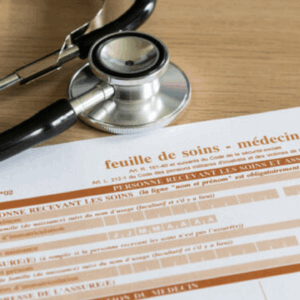Pregnant in France: What to expect at your first trimester appointment in France

Once you’ve confirmed that you’re pregnant by taking an at-home pregnancy test that you bought from your local pharmacy and you’ve taken the blood tests to further confirm this, it’s time to schedule an appointment with your local healthcare provider. This appointment needs to be scheduled within the first 3 months of becoming pregnant. Here’s what to expect at your first trimester appointment in France.
Disclaimer: The content of this blog post is based on my own opinions, experiences, and research. I am not a licensed health professional, and the information provided here is not intended as medical advice. Any actions taken based on the information in this post are at your own risk.
For personalized advice or if you are considering making any significant changes to your health routine, I strongly recommend consulting with a qualified healthcare provider. If you experience any adverse effects or have health concerns, please seek immediate professional help.
Your pregnancy can be monitored by a doctor (general practitioner or gynecologist) or a midwife, in a private practice, hospital or maternal and child health center (PMI). If you do not have a gynecologist yet, you can always ask your GP for a recommendation. I go to a center that has an array of doctors of all different medical backgrounds so I was easily able to schedule my first appointment with a midwife that was within my doctor’s office.
Why a midwife ?
In France, it is of the norm that from day one of your pregnancy, you will be followed by a midwife, either at a maternité or at an independant office, all the way through to after your baby is born. The midwife plays a crucial role of support and guidance throughout the process. Midwives go through a specific and rigorous educational training program that prepares them to be able to follow their patients from beginning to end, they also have the option to follow specific trainings that allow them to be able to perform ultrasounds and other tests. They can prescribe certain prescriptions as well as give advice on what sort of treatments to follow. If ever there is something out of the scope of their training/education, they will refer their patient to a specialist.
Midwives go through an education that is a 5-year long program (BAC +5) which includes a license LAS (Licence accès santé: a are non-medical or even non-scientific scientific licenses, for which students can take a “health access” minor option) or PASS (The specific health access pathway: focus primarily on medical subjects. If the student passes the first year of the degree course, he or she can apply to enter the MMOPK (medicine-maieutics-odontology-pharmacy-kinesitherapy) medical courses.) that is completed in the first year.
Once the license has been obtained, they then continue their studies in a school program for midwifery that is split into 2 cycles of studies. The first cycle consists of a 3-year program, DFGSMa, that grants the Diplôme de Formation Générale en Sciences Maïeutiques (General Training Diploma in Midwifery Sciences). The 2nd and 3rd year (DFGSMa 2 and DFGSMa 3) of study alternate theoretical and practical teaching, enabling midwifery students to acquire the basics of obstetrical, gynecological and pediatric physiology. This 3-year program includes the first year where the student obtains the LAS or PASS.
The second cycle is a 2-year program known as the DFASMa, Diplôme de Formation Approfondie en Sciences Maïeutiques (Advanced Training Diploma in Maieutic Sciences). These last 2 years combine theoretical and practical training. They cover diagnostic skills and knowledge of obstetric, gynecological and pediatric pathology. Midwifery students also take modules on contraception, ultrasound, assisted reproduction and much more.
At the end of their 5th year of study and the completion of the program, the student is awarded the midwife’s state diploma, which is required by law and is one of the prerequisites for practicing midwifery.
Expectations at the first trimester appointment
Due to my previous miscarriage a year prior, I had a few more visits in the first trimester than usual, a total of 4 before my end of the first trimester exam. At this point, I’d already had several blood draws done within 5 days of each other to track my betaHCG levels. My midwife had done an ultrasound at each appointment to check the status of the embryo as well as check the heartbeat. Leading up to the ultrasound at the end of the 1st trimester, my midwife had me do a full blood panel (bilan initial) that I needed to bring to my next exam.
During the exam, my midwife went over a boatload of subject. She did a full exam (measured my weight, height, blood pressure, etc…) and asked me questions about my family history. I brought along my vaccine record so she could look that over and note anything necessary in my file. I also had my medical file from Ohio translated and gave her that (I had a few minor uterine procedures that felt need to be noted for pregnancy) so she could add any information to my file.
We discussed my daily habits, from eating to exercising to recreational. She asked me questions about my job, what I did, any type of physical activity and how I dealt with my professional life on an emotional level. She also asked my relationship with my husband (he was present at the appointment) and our families. We both openly discussed our sentiments and thoughts on this pregnancy. She also discussed various medications that were allowed during pregnancy and those that weren’t, especially during the first trimester due to the developing fetus.
After that was over, she had me lay on the exam table and prepare for an ultrasound (pants were kept on, just rolled down a bit). Be prepared for the cold gel, no matter how mentally prepared I was, it was always a shocker. This ultrasound took place at week 13 and we were finally able to see a tiny human taking form. We were able to listen to the heartbeat, which my sound nerd of a husband asked for the frequency. This ultrasound, my midwife took around 30 images that I received on my compte rendu that I would then take to the lab when I took my blood test for the trisomie 21. We were able to see Baby L from literally every angle. We were also able to confirm the suggested due date of the baby as well as our midwife was able to check for any major malformations at that time.
Here are the following things I left with after the appointment:
- Certificate of the declaration of my pregnancy.
- Proof that my midwife submitted my paperwork for the declaration.
- Summary and ultrasound images of the exam.
- Prescription for the blood test for downs syndrome.


You May Also Like

Pregnant in France : Congé Maternité
9 March 2025
Feuille de Soins in France: What It Is and How to Use It
12 September 2025
One Comment
Pingback: